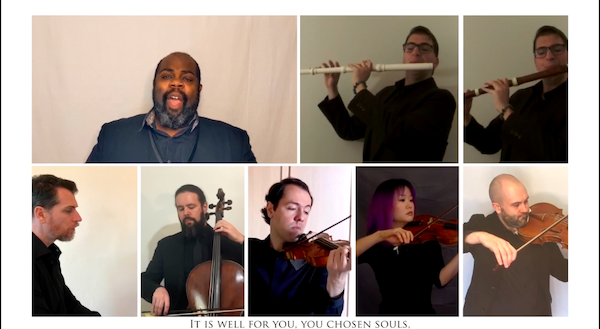Tragedy and joy manifest in moving Seraphic Fire program

Seraphic Fire continues to present compelling virtual concert programs that mix specially produced material with archival performances. “Eternal Fire,” the choir’s latest presentation streamed on Sunday afternoon, combined a joyous Bach cantata with a 21st century American masterpiece of deeply tragic character.
Bach’s Cantata No. 34 “O ewiges Feuer, o Ursprung der Liebe” (O eternal fire, o source of love) was written for Pentecost Sunday. It is a festive score with two large scale choral outer movements surrounding one of Bach’s most beautiful arias. Seraphic Fire first performed the score in 2017 with the Cleveland Orchestra under Franz Welser-Möst as part of that ensemble’s Miami residency.
For this webcast, the 10 choir members, three soloists and 12-member period instrument ensemble all taped their parts separately. The group’s audio and video production team then assembled the tapes together to produce a full performance.
Artistic director Patrick Quigley must have spent countless hours rehearsing the singers and players via Zoom to coordinate tempos, phrasing and balances. The unified result was nothing short of remarkable. The singing fully recreated the corporate gleam and polish one has come to expect from this chamber choir and the instrumental component blended felicitously with the choral and solo sections.
Josh Cohen and Perry Sutton’s trumpets pealed forth triumphantly in the choruses that bookend the work and the momentum and drive of the performance was invigorating. Steven Soph’s fine lyric tenor and John Buffett’s warmly resonant baritone effectively conveyed the brief recitatives, accompanied in stalwart fashion by cellist Guy Fishman and harpsichordist Leon Schelhasse..
At the work’s heart is the alto aria “Wohl euch, ihr a veerwähten Seelen (It is well for you, you chosen souls). Accompanied by serene flutes, Reginald Mobley’s countertenor took on an otherworldly sound with nobility of phrase and purity in the high register. The entire performance was a tribute to all the participants for their sheer musicianship, dedication and resolve to perform at top strength even under the present difficult circumstances.
The choir’s 2018 performance of the little match girl passion by David Lang was accompanied with illustrations by longtime Seraphic Fire member Steven Bradshaw. Lang won the 2008 Pulitzer Prize for his musical depiction of Hans Christian Andersen’s tale. In a pre-performance conversation with Quigley, Bradshaw related that he has removed the color of a Danish village from his drawings. His depiction of a homeless young girl freezing to death in the bitter cold of New Year’s Eve was well matched to Lang’s 15-part, 35-minute opus.
Lang’s setting of the story of a young girl sent out in the cold to sell matches by her cruel father is one of the first great choral works of the 21st century. The altos carry the story line in the narrative sections which are interspersed with chorales in the manner of Bach’s passion settings. “Come, daughter,” the score’s opening section, immediately plunges into the story’s darkness. Lang’s quasi-minimalist aesthetic conjures up a sense of tragedy with powerful immediacy.
The sweetness of the chorale. “Dearest heart” belies the girl’s fateful predicament. Tears equate to rain (the “Penance and remorse” section) as the narrative’s tone becomes ever sadder. In “Ah perhaps” the warmth from the matches the protagonist lights to keep warm brings forth a warmer, fuller choral sonority. Chimes (played by percussionist Matt Henderson) ring like a death knell and match the bleak, layered harmonies of “Have mercy, my God.” The simplicity of choral lines in Lang’s painting of the girl’s hallucination of seeing her dead grandmother in the sky and her plea not to leave her in her last hours ring with potent immediacy. As bells accompany the description of the girl’s lifeless body, the repeated final words “Rest soft” are deeply moving in their painful vision.
One can hardly imagine a better performance of Lang’s unique composition than Quigley drew from his 13-voice ensemble. Articulation of the text was so clear that the titles on the screen were hardly necessary. The blend of voices matched the singular beauty of Lang’s harmonic and melodic writing and vividly conveyed the depth of feeling in this secular passion. The program was a wonderful illustration of Seraphic Fire’s balance of old and new musical classics, performed at the highest level.
The stream of “Eternal Fire” is available at seraphicfire.org.
Posted in Performances
Leave a Comment
Mon Mar 22, 2021
at 12:19 pm
No Comments






